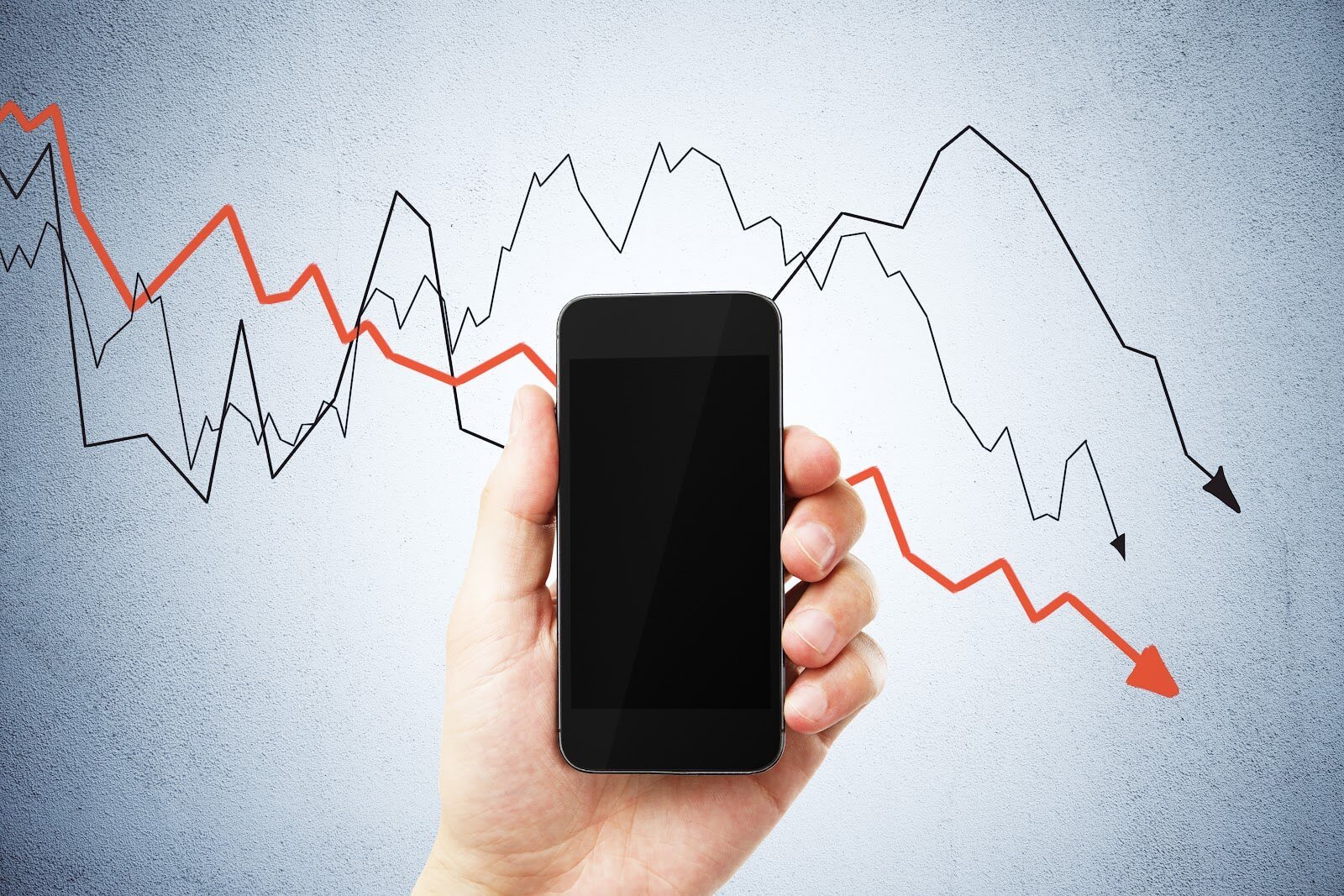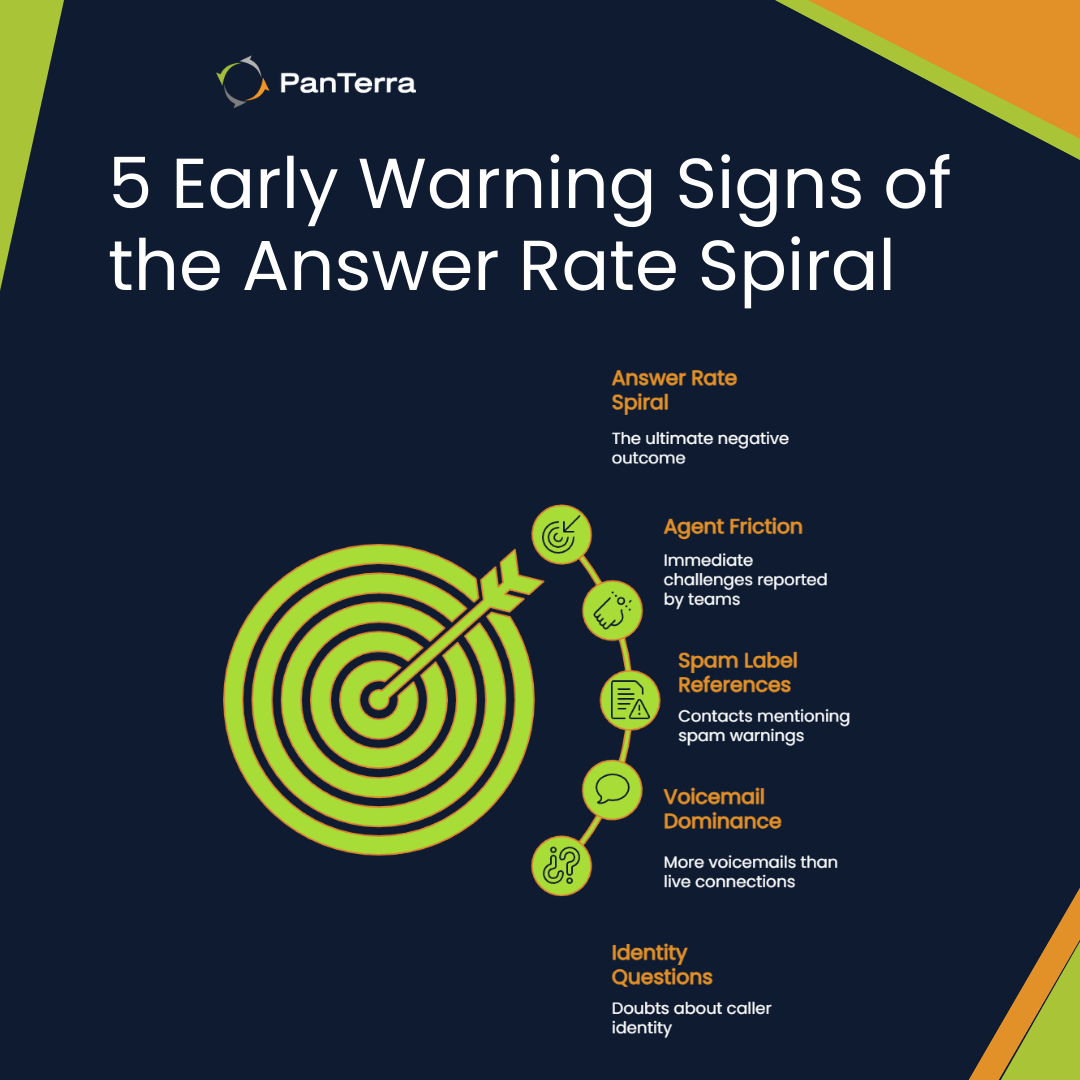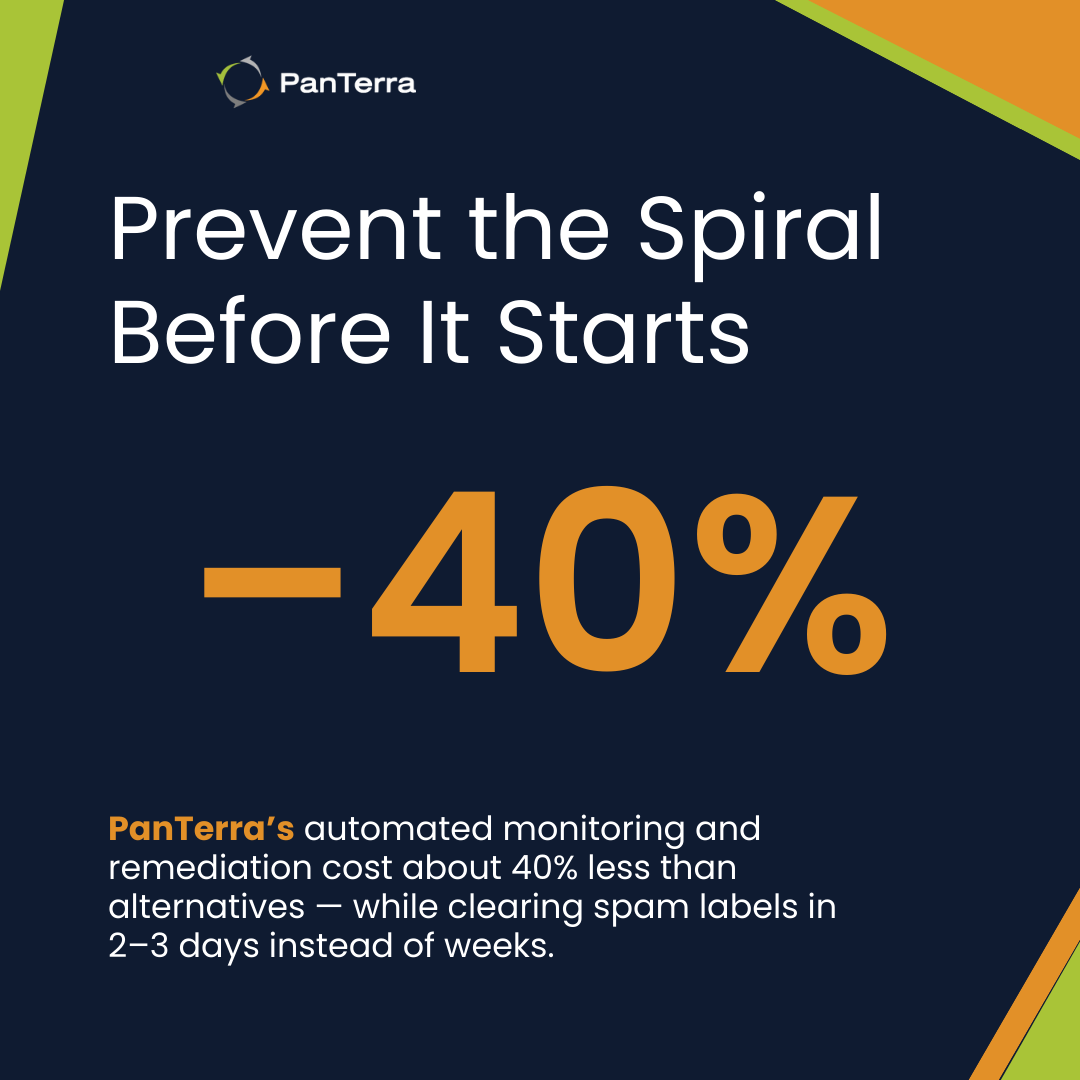Phone Number Reputation Management: 5 Warning Signs Before Spam Labels Hit
November 27, 2025

If you're experiencing a cascading reputation problem, you know the answer rate spiral tends to accelerate rapidly once it begins.
In our comprehensive reputation management guide, we explained why phone reputation differs from other channels.
The answer rate spiral happens when declining engagement makes carrier algorithms trust your numbers less, which then accelerates answer-rate drops even further.
This piece delivers the tactical layer: how to detect the spiral early and recover before spam labels and lost connections compound.
Navigate Here:
- What Are the 5 Warning Signs of the Answer Rate Spiral?
- Why Do Signal Combinations Trigger Spam Labels?
- What's the Recovery Protocol for Flagged Numbers?
- Why Doesn't STIR/SHAKEN Prevent Spam Labels?
- How Does PanTerra Prevent the Spiral?
- Phone Number Reputation Management FAQs
TL;DR:
- The answer rate spiral starts before "Spam Likely" shows up; early operational shifts are your first signal.
- 5 warning signs show you're sliding into the spiral, even if your team and scripts haven't changed.
- Algorithms flag fastest when multiple risk signals stack together, not from one behavior alone.
- If you're already flagged, recovery can begin immediately and typically clears within a few business days, but the full operational reset takes longer.
- STIR/SHAKEN confirms identity but doesn't stop behavior-based labeling, so reputation monitoring is still required.
- PanTerra prevents the spiral by monitoring numbers continuously and triggering remediation before labels spread.
What Are the 5 Warning Signs of the Answer Rate Spiral?
The answer rate spiral begins with subtle operational changes before any carrier displays "Spam Likely." Analytics engines detect patterns first, then propagate labels network-wide.
These signs indicate the spiral beginning before labels appear. Monitor them daily:
1. Answer Rates Show Progressive Weekly Decline
What starts as minor variance becomes a clear downward trend.
2. "Who Is This?" Texts Spike After Calls
Customers who requested contact still ask for identification. This indicates carrier-level labeling has started.
3. Voicemail Messages Outnumber Live Connections
When voicemail outcomes significantly exceed live conversations—especially with warm leads—it signals reputation issues.
4. Callbacks Question Spam Labels
"Did you just call? My phone showed spam..." becomes a common response.
5. Agent Confusion Reports Multiply
Teams report immediate hang-ups or legitimacy questions from verified leads.
Common scenario we see: healthcare practices noticing patterns #1 and #3 simultaneously. Within 10 days, major carriers labeled them "Spam Likely."
These are early symptoms of reputation algorithms turning against your numbers.

Why Do Signal Combinations Trigger Spam Labels?
Single behaviors rarely trigger spam flags. Specific combinations create the highest flagging risk.
Carriers track individual signals: volume bursts, geographic spread, engagement rates.
But algorithms treat combined signals as strong evidence of spam.
High-Risk Pattern Combination:
- Rapid-fire calling: Multiple calls in short windows
- Brief connections: Consistently short call durations
- Low engagement: Minimal callback or response rates
- Result: Can trigger flags within days
Common False Positive Scenario:
- Legitimate multi-state operations
- Standard shift-based calling times
- Normal B2B voicemail rates
- Result: Mistaken for automated calling
Insurance agencies demonstrate this perfectly. Thirty agents sharing a number pool, calling nationwide—each behavior legitimate individually. Combined? Can be flagged within days.
The algorithms can't distinguish legitimate business patterns from abuse when multiple signals converge.
What's the Recovery Protocol for Flagged Numbers?
Most carriers clear flags within 2-3 business days once remediation starts.
The complete operational cycle spans 5 days.
Before Day 1: Immediate Actions
- Pause high-risk campaigns for 48 hours
- Shift critical calls to trusted numbers
- Document business case for calling patterns
Day 1: Documentation & Assessment
- Screenshot reputation across all carriers
- Export call logs for pattern analysis
- Identify specific trigger combinations
- Compile business purpose documentation
- Time investment: 4 hours
Day 2: Submit Remediation Requests
- File formal requests with major carriers
- Register with reputation analytics platforms
- Submit business verification documents
- Cost: $10/number/month with PanTerra's managed service
- Time investment: 2 hours
Days 3-4: Active Clearing Period
- Labels begin clearing (2-3 day typical window)
- Monitor reputation across networks continuously
- Implement temporary number rotation if critical
- Test with different devices and carriers
- Status: Most carriers clear by Day 4's end
Day 5: Verification & Prevention
- Confirm clean status across platforms
- Document adjusted calling protocols
- Establish ongoing monitoring systems
- Train team on pattern modifications
Without automated systems, this process typically stretches to the 1-3 weeks documented in our guide, requiring constant manual verification
Why Doesn't STIR/SHAKEN Prevent Spam Labels?
STIR/SHAKEN authenticates identity, not intent.
Many businesses assume STIR/SHAKEN compliance equals protection. This misunderstanding quietly drains outbound performance across industries.
Here 4 practical steps you can take to prevent Spam labels:
Required Tactical Adjustments:
- Distribute volume across larger number pools
- Increase intervals between call attempts
- Document every customer-initiated request
- Monitor reputation separately from attestation
STIR/SHAKEN helps prevent spoofing. It doesn't protect against legitimate numbers exhibiting spam-like behavior.
How Does PanTerra Prevent the Spiral?
PanTerra's Reputation Management add-on prevents the answer rate spiral through proactive monitoring and automated remediation.
Instead of reacting after "Spam Likely" appears, the system detects early warning signals from day one and intervenes before performance collapses.
Key prevention features:
- 24/7 monitoring across AT&T, Verizon, and T-Mobile networks
- Automatic remediation triggers before full flagging occurs
- 2–3 day recovery versus manual processes that often take 1–3 weeks
- 40% lower cost than alternative solutions
- $10 per number per month for complete protection
Example scenario: A regional bank detects a sustained decline in answer rates through PanTerra's monitoring. The system automatically adjusts calling patterns and submits remediation before a "Spam Likely" label appears, enabling recovery within about 48 hours without customer impact.
For mid-market organizations managing 50–100 numbers, this replaces significant manual overhead with a predictable monthly investment: often paying for itself by preventing even a single answer-rate spiral event.

The answer rate spiral represents a critical threat to outbound communication effectiveness.
Early detection through the five warning signs prevents the 30-60% answer rate drops that cripple sales and service operations.
Don't wait for "Spam Likely" to appear.
Talk to a PanTerra specialist to audit your phone reputation and see where the spiral is starting
Phone Number Reputation Management FAQs
How quickly can answer rates recover after remediation?
Most carriers clear spam labels within 2-3 business days. Full answer rate recovery takes 5-7 days as consumer devices update.
What's the difference between monitoring and remediation?
Monitoring detects reputation issues in real-time. Remediation clears existing spam labels. Both work together for complete protection.
Can we handle reputation management internally?
Possible but resource-intensive. Manual processes take 1-3 weeks versus 2-3 days with automated systems. Most organizations find it unsustainable.
How many calls trigger spam algorithms?
Generally, 50+ outbound calls per day per number. Pattern combinations matter more than volume, and multiple risk signals can trigger flags below this threshold.
Does changing phone numbers fix reputation issues?
Provides temporary relief only. Without addressing root causes, new numbers typically get flagged within 2-4 weeks.
.jpg?width=500&height=500&name=Are%20you%20Getting%20a%20Good%20Deal%20(1).jpg)
Comments